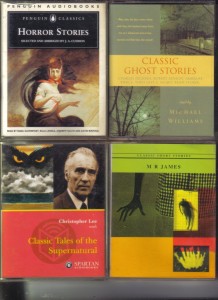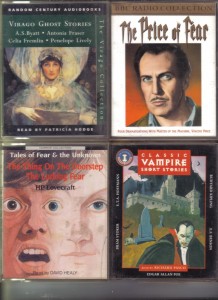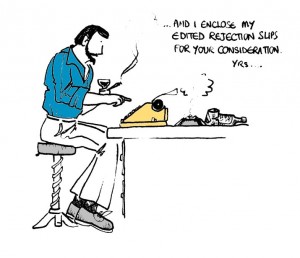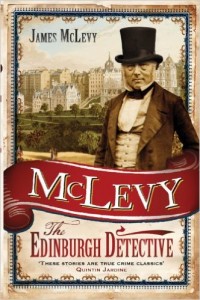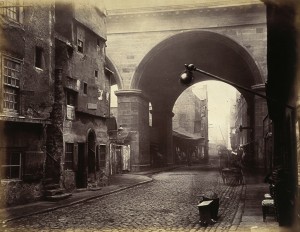You now know what a lurcher is. You are fully prepared for the general mayhem, and have secured yourself and your home against lurcher-related disasters. At this point we must make it clear that you have missed something. You don’t know what you’ve missed, but your dog does. The lurcher is a cunning beast…
But this does allow us to move onto a few more advanced concepts. There may even be some serious points here, but we did say ‘advanced’.
The Alpha
Lurchers like being in packs, and will happily scoot off into the distance en masse. The pack is a working unit, and there is no finer sight than three or four lurchers shrieking wildly as the entire pack completely fails to climb a tree and get that damn squirrel. In fact, they like packs so much that they will also investigate that pack of biscuits, that pack of wafer-thin ham, and especially that pack of pork chops which you left in the bottom of the shopping bag by mistake.
Most packs have alphas. They may have omegas, as well, but the alphas don’t let them get a word in. Alphas can be female or male, proving that dogs recognised the work of the suffragette movement long before people did. In your home, the alpha dog’s main tasks are to get the food before anyone else (including you), keep the food whether they want it or not, and tell everyone that they’re keeping it in no uncertain terms.
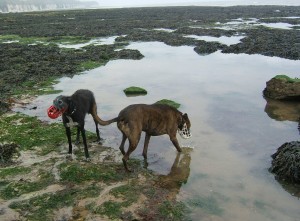 An alpha female waits for a dim pack member to discover that seawater tastes yucky
An alpha female waits for a dim pack member to discover that seawater tastes yucky
Alpha dogs, remembering the dull time they used to spend in caves, also tend to grab the best and highest places to sleep. Many amusing ‘experts’ make it clear that you, the human, must be the alpha in order to retain control and discipline. This is a sound theory. In practice it is probably why:
a) You cannot get onto the sofa, and
b) If you are on the sofa, the lurcher is on top of you.
In fact, most lurchers, alpha or omega, believe they are lap-dogs. This leads to pleasant companionship until your lurcher is 20 kilos and over, at which point it leads to compression injuries, deep vein thrombosis or cramp. The dog’s fine, though, so that’s alright.
Useful Exercise A: Lock yourself in the bathroom, ignore the scrabbling outside the door and say to yourself “I am the alpha.” ten times. It won’t make much difference, but it’s always good to have ‘you’ time.
Equipment
The wide martingale/greyhound collar is standard because, hey, would you want to be choked twice a day? If you would, then we doubt you have the time or energy to deal with lurchers. Well fitted head-collars (such as a Halti) can also work well, oddly enough both for lurchers and for devotees of peculiar erotic practices.
The next most vital piece of equipment is the lead. Leads are controversial devices, especially with your lurcher(s), but we at greydogtales are here to give you a quick run-down.
A good simple lead can be made of leather, reinforced fabric or nylon. It should be made of combat-tested kevlar/carbon fibre and vetted by NASA to be able to restrain a space shuttle, but it probably won’t be. You will be washing your lead, because your lead will be wet, tangled, muddy, and smeared with fox poo and bird droppings. Nylon is easiest to wash, generally. Leather is nice, but can become very, very smelly and stiff after a while, so needs more care.
Metal chain leads are clanky, heavy and, if you walk your dogs near cattle fences, extremely good at transmitting a surprising electric shock when your dogs pees on or investigates a live fence. greydogtales has been there.
Long-line leads are a Good Idea when training for recall. If you are lucky. Lurchers are known to have two methods for dealing with long-line leads. The first is to stand there until you get bored and take the long-line off, at which point the lurcher runs away at high speed. The second is to run at an equally high speed in a circular motion until you are completely trussed up in 30 metres of durable nylon rope. Some patience is required.
Extendable leads are not recommended, unless you have a thick-necked, very slow old bassett hound which likes to potter at a slight distance. They seem tempting, until the lurcher runs off and hits the end of the lead’s length. Which they will. Three things can happen at this point:
a) Bits of the dog break;
b) Bits of you break;
c) The ratchet mechanism and/or the clasps break.
None of these make an extendable lead worth the risk.
Useful Exercise B: Have a partner or friend take you shopping with a choke chain on, and see how you like being asphyxiated every time you head towards that special offer on malt whisky.
Poo bags are a must. Do practice indoors first, though, and get used to poking your fingers through them and getting something icky all over your hand. Cold, lumpy chocolate pudding is an excellent substitute to use in practice sessions. Also be aware that if there are nettles or spiky bushes around, some lurchers will shove their bums in these, just to watch you struggle. Lurchers have a very keen sense of humour. They will also wait to relieve themselves until you are in full view of nearby pedestrians, grumpy homeowners and slow moving traffic, at which point they will have a graphic bowel movement. It amuses them.
More complex devices for scooping up poo are available, but most make you look like a deranged person trying to hoover the pavement.
Muzzles are another Serious Subject, and may be tackled at a later date, if our alpha allows us to take ours off.
We were also reminded that in the last instalment of Lurchers for Beginners, we did not mention the word W-A-L-K-I-E-S. This is partly because even typing the word is risky, and partly because at greydogtales we have a simple, non-verbal system to alert the dogs that a walk is imminent. This consists of:
- putting on anything that looks like a coat or jacket
- going anywhere near the front door, even if you were heading upstairs
- looking like you were going near the front door
- moving a lead out of the way to get at the post in the hallway
All of the above spell D-O-O-M.
Useful Exercise C: Try to leave your house without your dog(s) noticing. No? I told you.
And that’s it for now, my dearest listeners. October and Hallowe’en are on their way, and there is spooky stuff coming. Do not abandon ship, though – longdog updates will continue (on and off!).
